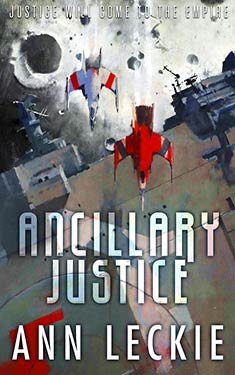RYO Review: Ancillary Justice by Ann Leckie

 Hype is an untrustworthy thing, which has led me astray before. It either ratchets my hopes so high that they’re bound to be disappointed (see: A Song of Ice and Fire) or it leaves me snarking condescendingly about popular opinion and the “masses” and how no one really understands empire (see: The Hunger Games). But sometimes, hype operates like giant flashing arrows pointing me towards a book that I never would have otherwise discovered, and my entire faith in popular opinion and my fellow genre-readers is restored. That was my experience with Ancillary Justice, Ann Leckie’s 2013 debut novel. From the back-cover blurb, I would never have bought it: On a remote, icy planet (oh look, Hoth) the soldier known as Breq (oh look, an ex-military alias) is drawing closer to completing her quest (gee, tell me more). But it was a riveting, smart, and brilliantly composed novel, which has convinced me that the space epic is still alive and well.
Hype is an untrustworthy thing, which has led me astray before. It either ratchets my hopes so high that they’re bound to be disappointed (see: A Song of Ice and Fire) or it leaves me snarking condescendingly about popular opinion and the “masses” and how no one really understands empire (see: The Hunger Games). But sometimes, hype operates like giant flashing arrows pointing me towards a book that I never would have otherwise discovered, and my entire faith in popular opinion and my fellow genre-readers is restored. That was my experience with Ancillary Justice, Ann Leckie’s 2013 debut novel. From the back-cover blurb, I would never have bought it: On a remote, icy planet (oh look, Hoth) the soldier known as Breq (oh look, an ex-military alias) is drawing closer to completing her quest (gee, tell me more). But it was a riveting, smart, and brilliantly composed novel, which has convinced me that the space epic is still alive and well.
Your protagonist is, indeed, a lone ex-soldier known as Breq. Breq used to be a ship. Follow me, here—for a couple of thousand years, Breq was a single self-aware entity, which was a ship and a few thousand individual human-ish bodies. As that ship (Justice of Toren) and as each individual soldier (ancillaries), Breq served the militaristic interests of the vast Radchaai Empire. But now she’s only one body, passing as human, and tromping through an arctic wilderness. Her only ambition is near-suicidal revenge against the ruler of the Radchaai Empire, Anaander Mianaai. Except that Anaander is just as annoyingly many-bodied as Breq used to be, and therefore very challenging to assassinate. The plot is so well arranged in a series of compelling revelations that any further summarization endangers the joy of reading it.
 For those who are skeptical of space operas, and particularly the Robot who Learns to Love theme or the Robots Rebel against their Masters theme, let me assure you that the plot of Ancillary Justice avoids those well-worn tracks. Breq is an emotional being from the beginning—“Without feelings insignificant decisions become excruciating attempts to compare endless arrays of inconsequential things. It’s just easier to handle those with emotions,” (88)—who doesn’t need a compassionate human companion to teach her how to love. In fact, rather the reverse happens. She’s also, at heart, a citizen of the Radchaai Empire and not its slave. She partakes in their deadly civilizing mission, she worships their god, and she perfectly understands their imperial philosophy. This isn’t a slave-machine’s revenge; it’s a personal, human revenge.
For those who are skeptical of space operas, and particularly the Robot who Learns to Love theme or the Robots Rebel against their Masters theme, let me assure you that the plot of Ancillary Justice avoids those well-worn tracks. Breq is an emotional being from the beginning—“Without feelings insignificant decisions become excruciating attempts to compare endless arrays of inconsequential things. It’s just easier to handle those with emotions,” (88)—who doesn’t need a compassionate human companion to teach her how to love. In fact, rather the reverse happens. She’s also, at heart, a citizen of the Radchaai Empire and not its slave. She partakes in their deadly civilizing mission, she worships their god, and she perfectly understands their imperial philosophy. This isn’t a slave-machine’s revenge; it’s a personal, human revenge.
The writing is not especially beautiful sentence by sentence, but it is masterfully structured. Many authors attempt to interweave their character’s backstory with the current action, with lots of clunky transitions like “But that was before the war…” and the overuse of the past perfect tense. But few writers can distribute the tension evenly between the past and the present, building two distinct but equally enthralling plot lines. Leckie can, or did, or has done. The bulk of the novel is a series of back and forth reveals, which never descends into static exposition.
Leckie also has a gift for clarity. She’s writing in first person for a being that is simultaneously a single individual in the present, a ship’s AI in the past, and hundreds to thousands of additional human-like bodies called ancillaries. In an individual scene, from one sentence to the next, the action might move from an ancillary serving tea on the deck to an ancillary listening to treason on another floor to the ship’s knowledge of each human’s medical status and back to the ancillary serving the tea. And it’s not confusing. Writing like this has none of the lyricism or juicy embellishment of a Valente or a K. J. Bishop, but the clean, elegant bones of it are just as gorgeous to read.
There’s one element of Ancillary Justice that every reviewer must unavoidably comment on. In an especially clever aspect of world-building, the Radchaai have no sense of gender in our traditionally dualistic sense. Their language has no way of distinguishing genders, so all gendered language is simply translated as female (she, her, sister, daughter). As a result, the reader often has no idea what the biological sex of any given character might be—I’m not even certain that Breq’s own physical gender was ever revealed. Perhaps predictably, some readers were displeased. It’s been seen as a gimmicky trick, which tries to clumsily to enforce “genderblindness.” I found it to be a brilliant, gorgeously realized, and rather wicked piece of world-building, which performs many functions simultaneously.
First and most obviously, the confusion of character gender challenges the reader by making them abruptly self-aware of their near-obsessive need to know a character’s gender. That, I assume, is what makes people react so strongly to Ancillary Justice—realizing their own dualistic social constructions makes them feel tricked, irritatingly uncertain. If a character is crying, for instance, do we interpret it as a man showing himself to be emotionally vulnerable? Or a woman in hysterics? Or, god helps us all, a human experiencing a powerful emotion? It also, of course, neatly combats the baseline assumption of masculinity that has plagued science fiction (and the rest of fiction, and real life) for so long.
But it also does that thing so fundamental to good science fiction: It plucks us out of our constructed culture, and plops us down uncomfortably into someone else’s. It makes the Radchaai feel alien and inscrutable, and the process of getting to know them—through their gods and philosophies, their uniforms and client-based romances—is the process of immigrating to a foreign world.
Getting to know the Radchaai is also getting to know a vast and horrifically violent empire. I have a special place in my heart for a perceptively-written empire, and the Radchaai perfectly embody the dangerous moral certainty, the naked violence, and the deep schizophrenia of real empires (they also not-incidentally share a fondness for tea with the imperialists I studied as a grad student). The Radchaai are simultaneously the heartless evil empire of Star Wars, and a vividly real culture with politics and problems of their own. At one point Breq chastises a colonial woman for her one-dimensional view of the Radchaai: “You were surprised to see me deal gently with a child. It should not have surprised you. Do you think the Radchaai don’t have children?…Virtue is not a solitary, uncomplicated thing,” (156).
For those who never trust hype, let me be your giant flashing arrow. Ancillary Justice is entirely worth it–and there are two more coming in the series.



















 Full Details
Full Details


No comments yet.
Sorry, the comment form is closed at this time.